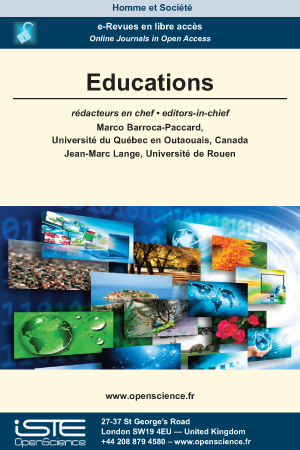

Social Sciences and Humanities > Home > Educations > Issue
In France, territories are increasingly carrying educational functions despite a fairly centralized education policy.Local heritage education is an example of the evolution of the relationship between school and territory but also questions the formal and non-formal educational goals, the functioning of the actors and the potential of artifacts to enhance territorial resources in informal education.
The gradual introduction - more or less formalized - from 1945 to the present day of the resources of the local territory in education in France, appeared to be a condition for the emergence of heritage education. We will first show how taking into account the local dimension of the territory very gradually emerged within the school of the Republic - both deemed to be one and indivisible! - in France. We will then analyze the successive contributions of the various “educations for” - by relying first on environmental education, then on education for sustainable development and finally on heritage education to the consideration of the local territory through education. We will thus see precisely that these three "educations for", which constituted so many significant milestones from this perspective, clearly testify today to a change - at least partial - of paradigm in the relations between the school and its territory. Finally, we will identify the major issues of heritage education in schools today, which can be broken down into three major questions: in terms of educational purpose, in terms of the legitimacy of the heritage objects to be taught and, finally, in terms of disciplinary contribution.
One of the specificities of the educations for is to inextricably combine knowledge with values imported from the socio-political sphere. This poses the ethical problem of their justification: how to avoid making education a standardization enterprise without falling into a relativism which equates knowledge with opinions? This chapter presents the guiding principles of a problematization that is specific to "education for". They proceed from the analysis, led by Canguilhem, of the relationships between knowledge and values in the history of science. Explaining that values, in order to make sense, must be replaced in their logical opposition to anti-values, Canguilhem outlines a procedure for justifying teaching content that escapes both absolutism and relativism. Heritage education, classically in tension between these two pitfalls, will illustrate our theoretical point.
In French primary schools, partnership projects with regional natural park stakeholders allow us to reconcile formal and informal heritage education approaches. Based on partnership practices of educational actors (teachers and regional natural park workers) we seek to understand to what extent and under which conditions these could lead to the acquisition of professional skills of a collective nature. In three case studies, a methodology framework was used to analyse the projects, observations and video recordings picked up during exchanges between partners and in sessions with the class. The results allow us to identify very different levels of partnership that offer or not opportunities for professional development. The obstacles rest mainly the ambitions of educational actors in these heritage education projects.
In the current European economic context, the French tourist offer must develop innovative digital services (Boiron, 2014). This stake is all the morepresent since it is a question of being part of a “digital visual culture” (Catoir-Brisson, Jankeviciute, 2014). This is still preserving an enhancing these gestures of heritage development (Davallon, 2006), by rethinking and recontextualizing (Mucchielli, 2003) the traditional conceptions of the construction of knowledge. This without however firmly established desire to set a true digital culture (Licoppe, 2009).This research aims to understand how an innovative educational path (Corroy, Roche, Savignac, 2017) can serve to enhance a rural territory and, at the same time, allow students to learn about heritage by building their knowledge in such a culturallybased situation (Bouzon, 2010).

2024
Volume 24- 8
Issue 12023
Volume 23- 7
Issue 12022
Volume 22- 6
Issue 12021
Volume 21- 5
Issue 12020
Volume 20- 4
Special issue2019
Volume 19- 3
Issue 12018
Volume 18- 2
Issue 12017
Volume 17- 1
Issue 1